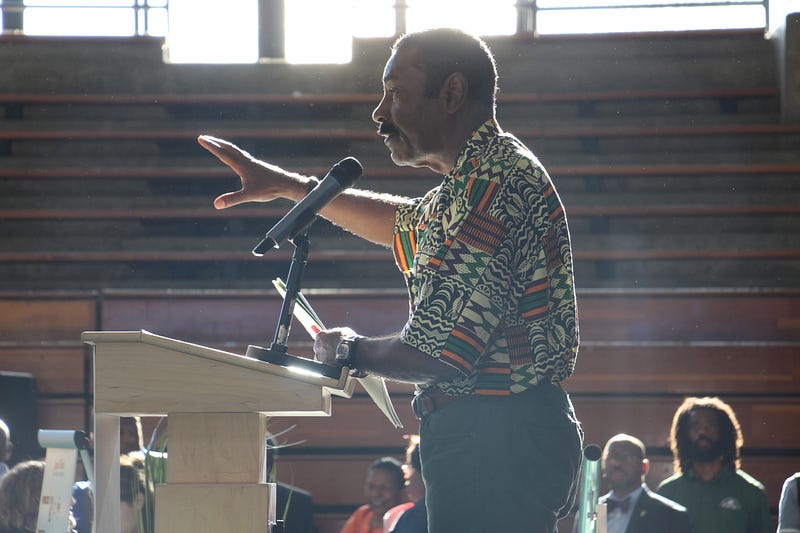
Laney hosts fourth annual African Americans Making Connections
By Chandra Faulkner
Laney College hosted the fourth annual African Americans Making Connections (AAMC) event on Oct. 7. The event combined networking with political activism to organize African-American organizations, businesses and leaders within the East Bay.
Although the event took place in this month, the Ten Point Plan developed by the Black Panther Party 50 years earlier proved relevant to the advancement of the state of Black America.
According to AAMC Chairman Keith Carson, the event borrowed its topic from The Urban League’s study on “The State of Black America,” and a report from Alameda County’s Public Health Report that was released shortly before.
Attendees were asked to participate in a poll, the results displayed on a screen behind the panel speakers and updated throughout the event. The poll asked participants to choose three of the 10 points in the Black Panthers’ plan they consider to be top priorities today.

“It being the 50th anniversary of the Panthers, it was a good time to look back at the last 50 years in the Black community,” Carson said. The statistics he presented in his opening remarks gave insight to that query.
Carson highlighted the fact that 50 years ago in the Bay Area, although unemployment has gone down a few percentage points, black unemployment was double the amount of white unemployment then, and remains that way today.
Carson, who is also Alameda County District 5 Supervisor, hosted a panel discussion with political heavy-hitters Rep. Barbara Lee (D-Oakland), Chairman of the Los Angeles County Board of Supervisors Mark Ridley Thomas, Malia Cohen from the San Francisco Board of Supervisors, and Sr. Vice President of the National Urban League Don Cravins, Jr.
Rep. Cedric Richmond of Louisiana, who is also the Congressional Black Caucus Chair, was unable to attend due to the recent hurricane in his home state that required his utmost attention.
The statistic-heavy panel discussion led to a Q&A session followed by four discussion groups which honed in on specific issues: economic security, urban revitalization and community development, education, health, and justice within the Black community.

Panelists were asked to state their opinion on what the top three priorities should be for the African American community to build a stronger, more progressive platform.
Moderated by KTVU 2 newsman Paul Chambers and Oakland City Councilwoman Lynette McElhaney, the panel started with Rep. Lee. Lee stated that in her district, the African American population has decreased from 34 percent black to 19 percent since 1998.
She mentioned that the tech industry has provided a lot of economic opportunity for a lot of people but that, “African Americans in the Bay Area are being left behind.”
Lee’s three ideas to improve the state of Black America were: create a trust fund to aid in the housing crisis in ways that affect the black community, such as access to loans and displacement; think about the black community as including the entire diaspora; and get young people involved on a global level.
She encouraged people to “Get involved and stay woke!”
Cravins of the National Urban League, the century-old organization whose mission it is to ensure equal rights for African Americans, revealed unemployment statistics: quadruple the number of Blacks to whites are unemployed, and that the average income of Black households is half of white households.

“They tell us to pull ourselves up by our own bootstraps, but we only have one boot and one strap!” he said. He championed voting, adding, “If voting wasn’t so important, they wouldn’t be trying to stop us from doing it.”
Cohen of the San Francisco County Board of Supervisors echoed this sentiment, stating that “people fought and died for our right to vote.” She also reported a decrease of African Americans in San Francisco, which is now only three percent of the city’s population.
She said she had three priorities, the first of which was to understand what the passage of Proposition 64 (the legalization of recreational marijuana) means for incarcerated African Americans in California.
Another of these priorities was to stop the “systematically destructive” advertising of menthol and flavored tobaccos and sugary drinks in black neighborhoods. Finally, her third priority was to reform the fines and fees as undue tax on the poor in all Bay Area counties.

Thomas, chairman of the Los Angeles Board of Supervisors, focused on the issue of homelessness. He told the crowd that though only nine percent of L.A.’s population is African American, while 39 percent of its homeless population is African American.
The percentage of homeless who are Black in Alameda County is 49 percent; 51 percent being everybody else.
The Empowerment Breakout Workshops followed the panel discussion. Laney psychology student and Peralta Community Colleges District Student Trustee Corey Hollis attended a workshop called “Education: Parent/Community Engagement.”
Hollis’ concerns are about access to higher education, and about education becoming privatized, which is the interest of Secretary of Education Betsy DeVos.
Aisha Jordan of the Associated Students of Laney College expressed a desire to restore the community and the importance of being involved with as many positive projects as possible. Jordan attended the workshop on Community Justice, focusing on policies that destabilize black communities.
After the discussions, the “Report out and Action” panel moderated by KBLX’s “All Tied Up” host Armand Carr, summarized the four topics and detailed actions.
Attendees gave input in the discussions, and solutions were presented for each topic.
Carson summarized the event by saying, “We’re going to have to go back 50 years, like the Black Panthers did, and support our own infrastructure.”
The African Americans Making Connections are planning a follow-up event for February 2018. They hope a lot of young people attend, are presenters, and represent progressive organizations.
Chandra Faulkner is a Tower Staff Writer. Email her at chachachandra(at)gmail.com.

























